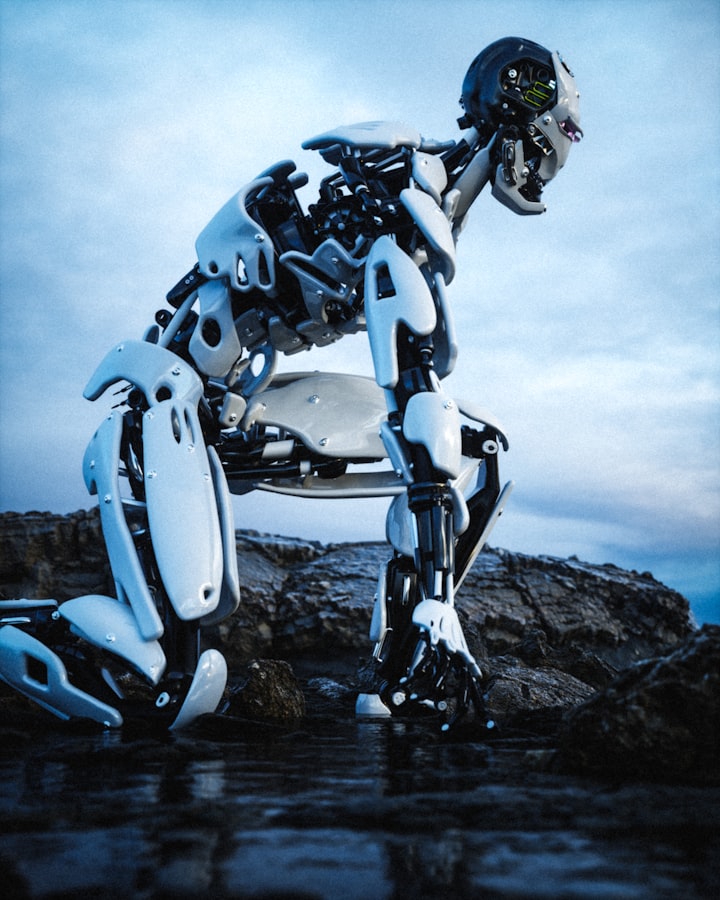Prometheus to Cyborg:
The Evolution of Man
The modern human being distinguished by its highly developed brain, capacity for well-articulated speech, and abstract reasoning, seem to have evolved significantly from its origins, advancing by leaps and bounds into a post-humanistic future.
Humanity's future may evolve its way out of existence or it may branch off into a new species far removed from the creatures several millennia ago. Anthropological studies have demonstrated that modern humans are the product of millions of years of evolutionary change. This change continues as we make advances in technology, science, and medicine. The literature and film of the science fiction genre have proposed possibilities that seem to be closer to reality than first imagined.
The Star Trek franchise that began in the 1960s developed into an amalgamation of posthumanism. Star Trek: First Contact, directed by Jonathan Frakes, continues to explore what it means to be human and the consequences inherent when those attributes that make us unique are stripped away to make room for perfection.
As discussed in Beginning Theory: An Introduction to Literary and Cultural Theory, Peter Barry states that "posthumanism involves a rejection of what is sometimes called 'human exceptionalism', which is the conviction that our own species is special, and uniquely gifted and privileged, as the pinnacle of evolution" (Barry 338). In Star Trek: First Contact, man's superiority is challenged by a technologically enhanced species called the Borg. The Borg are the villains found in the Star Trek universe. Assimilation into the Borg collective consists of numerous races through the use of nanobots. These races are turned into cyborgs against their will. Ultimately the Borg seeks to dehumanize mankind by removing emotion and the agency to make choices. The Borg do not recognize free will or the individual. The Borg functions as a hive mind, seeking perfection through the assimilation of others. The individuals who are assimilated are added as equipment to help the system run more efficiently.
Prior to cyborgs, or mechanically and technologically enhanced human beings, landing on the literary scene, early posthumans were monsters found in horrors. Barry adds that posthumanism included "'transhuman' entities such as vampires, zombies, and revenants" (Barry 339). The sensational tales of terror of the Victorian era are great examples of posthuman and transhuman villains that seem to be caught on the threshold between humans and the "other". These stories include The Strange Case of Dr. Jekyll and Mr. Hyde by Robert Louis Stevenson, Bram Stoker's Dracula, Oscar Wilde's Gothic Fairy Tale, The Picture of Dorian Gray, and Mary Shelley's The Modern Prometheus, otherwise known as Frankenstein. All of these stories contain the birth of new creatures or species that originated from man. Some, like Frankenstein's monster, ask the question: why do I exist, and why did you form me? Shelley's monster connects with the following question posed in lines from John Milton's Paradise Lost:
Did I request thee, Maker, from my Clay
To mould me Man, did I sollicite thee
From darkness to promote me, or here place
In this delicious Garden? (743-746)
Do the posthuman monsters of the Victorian age benefit from a benevolent creator who only wants their happiness? Some imbued with immortality do not find happiness. Even in this state of immortality, each 'villain' holds a weakness, that at its center is the core of humanity. At this core, man does not want to live alone. In Donna Haraway's "Cyborg Manifest", she compares the Victorian posthumans to modern posthumans stating:
Unlike the hopes of Frankenstein's monster, the cyborg does not expect its father to save it through a restoration of the garden, that is, through the fabrication of a heterosexual mate, through its completion in a finished whole, a city, and cosmos (Haraway 151).
Frankenstein's monster is not immune to the desire for companionship and requests that he be provided a mate:
You must create a female for me, with whom I can live in the interchange of those sympathies necessary for my being. This you alone can do; and I demand it of you as a right which you must not refuse (Shelley 93).
Haraway is suggesting that a cyborg has no need of a companion in the sense that you or I need a companion for procreation - because the cyborg is genderless and the enhancements made to man through technology may make him impervious to death and in order to create another it only requires another human being to be enhanced with the same technology. This seems to be the case with the Borg species, with one exception.
The Borg Queen is both a part of the collective and an individual. She is able to make choices as well as control the collective. In the history of the Borg Queen, she also desires companionship and focuses her efforts on bringing Captain Jean-Luc Picard into the Borg Collective as an entity that is equal to her. Picard is transformed into a posthuman creature as prostheses are implanted to enhance and assimilate him into the collective. The Borg Queen spares Picard the fate of the Borg drone and tells him that he is unique. The Borg Queen does not fully assimilate Picard; she wants to keep him as 'human' as possible. However, the Borg Queen renames Picard "Locutus of Borg", designating him as the voice chosen to speak with The Federation on behalf of the Borg. With choice and reason intact, Picard also discovers that he is not satisfied with the enhancements and wants to be changed back. Picard's needs as a human being are not satisfied. This effort to turn man into machine is ineffective, thus resulting in a failure to assimilate Picard. However, the tension between man and machine remains.
This tension exists in the form of another character in the film. Lieutenant Commander Data, who is an android, desires to become more human. He wants to think and feel like a human. As a result, Data has a chip added that allows him to experience emotion. With all the good that comes with this ability, he also experiences fear and doubt. In a conversation between Data and Picard the emotion chip becomes a distraction:
Lieutenant Commander Data: Captain, I believe I am feeling... anxiety. It is an intriguing sensation. A most distracting...
Captain Jean-Luc Picard: Data, I'm sure it's a fascinating experience, but perhaps you should deactivate your emotion chip for now.
Lieutenant Commander Data: Good idea, sir.
[beep]
Lieutenant Commander Data: Done.
Captain Jean-Luc Picard: Data, there are times that I envy you.
Data could not perform his duties as a commanding officer because the human emotion of anxiety was distracting. This is a real phenomenon that occurs in humans. For some, fear and anxiety are so debilitating that we are unable to function in our world. Interestingly, Data's character embodies the values of humanist belief. He recognizes the potential value and goodness of human beings. He desires to be just like them and often emulates behaviors that he finds worthy, such as playing the violin and painting. He recognizes the need for companionship and develops a romantic relationship with a fellow officer. Eventually, he acquires a pet. A cat he named "Spot". Most importantly, he was created and designed to seek rational ways of solving problems. Logic and reason are primary systems for Data. The machine that seeks to be human is more human than his fellow crew members. And it is these qualities that help him resist the Borg Queen's seductive enticements to join her, even when she offers him the ability to "feel" flesh by adding skin to his arm.
Is it at all possible for humanity to be transformed, transcended, or eliminated through technological advances or evolutionary processes? Humans are more than their highly developed brains and their capacity to express and share abstract reasoning. Humans long for happiness; often found in companionship and involvement in collaborative communities. Is the quest for perfection and happiness at its end for humanity? Or is there a possibility to be more? For Data, it was the everyday life and experiences that he embraced that made him human. In this posthumanist world, where humanity seems to be attacked by itself in the form of racism and discrimination, there is hope that the desire for happiness and community may outway the pursuit of perfection.
References:
Barry, Peter. Beginning Theory: An Introduction to Literary and Cultural Theory. Fourth ed., Manchester University Press, 2019.
Haraway, Donna Jeanne, and Donna Jeanne Haraway. "A Cyborg Manifest: Science, Technology, and Socialist-Feminism in the Late Twentieth Century." Simians, Cyborgs, and Women: The Reinvention of Nature, Routledge, New York, NY, 1991, pp. 149-181.
Shelley, Mary. "Frankenstein; or The Modern Prometheus (The 1818 Edition)." Penny Dreadfuls: Sensational Tales of Terror, Barnes & Noble, New York, NY, 2016, pp. 1-153.
About the Creator
Rebecca A Hyde Gonzales
I started writing when I was about eight years old. I love to read and I also love to create. As a writer and an artist, I want to share the things that I have learned and experienced. Genres: Fiction, non-fiction, poetry, and history.







Comments
There are no comments for this story
Be the first to respond and start the conversation.